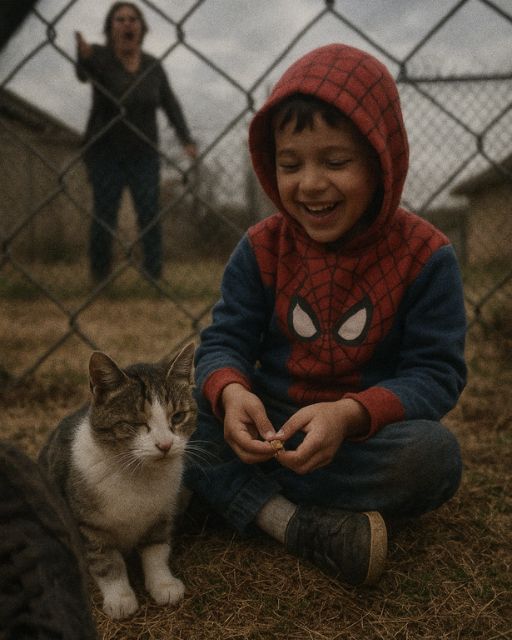I should’ve known that backyard wasn’t empty. It looked abandoned—rusty swing set, overgrown grass, broken fence—but the moment Mateo slipped through with that little stray cat, trouble followed.
He was just trying to help. He named her Pickles, even though she only had one good eye and fur matted from rain. Said she followed him home from school and looked “lonely.” I figured it was harmless—he sat with her by the fence, feeding crumbs from his sandwich, laughing like the world wasn’t such a hard place.
Then she showed up.
Ms. Gibbons. Widow. Retired librarian. Lives alone in that little brick house with the perfect rose bushes and binoculars always nearby. She came storming out her back door like she’d seen a crime. Screaming something about trespassing, rabies, and how “people like us” don’t respect boundaries.
I tried to reason with her through the chain link, told her we’d leave. Told her he didn’t mean anything by it.
But she pointed a shaking hand and said she already called animal control.
And the cops.
I didn’t know whether to grab Mateo or the cat first. He looked up at me with that proud smile, like he’d done something brave.
And then, right as I reached for him, she said something that stopped me cold.
“The last time someone crossed that fence, my husband didn’t make it.”
Everything went still. Even Mateo stopped petting Pickles.
I opened my mouth, but nothing came out.
Ms. Gibbons stood there, breathing heavy, her face twisted in something between fury and pain.
“What… what do you mean?” I finally asked.
She blinked like she hadn’t meant to say it out loud. Her shoulders fell.
“He was a kind man,” she said quietly. “Always helping everyone. One day a kid kicked his ball over the fence. He hopped over to toss it back—slipped on the wet swing set. Hit his head. He never woke up.”
I felt my stomach drop. The rusted swing set, the uneven ground—it suddenly looked different. More like a memorial than a backyard.
“I’m… I’m sorry,” I said, stunned.
She nodded, but her face was tired. “That’s why I keep it locked up. Why I don’t want anyone crossing over. It’s not just the cat or the fence—it’s what I lost there.”
Mateo stood frozen, still holding Pickles.
“I didn’t mean to hurt anything,” he said, his voice small. “I just thought she looked lonely.”
Ms. Gibbons’ expression shifted. For the first time, she really looked at him. His torn backpack. His muddy shoes. The sandwich bag still clutched in his fist.
And maybe something in her softened.
“She’s a stray,” she said, still guarded. “Could be sick.”
“We can clean her up,” Mateo said. “She trusts me.”
Ms. Gibbons sighed, rubbing her forehead. Then she surprised us both.
“Bring her over,” she said.
“What?”
“Pickles,” she said dryly. “If that’s her name. Bring her to the front. I’ve got an old cat carrier in the garage. I’ll call my vet.”
Mateo lit up. “Really?!”
“But you—” she pointed at him, “stay on your side of the fence from now on. Deal?”
He nodded so hard I thought his head might fall off.
We walked around to the front while she disappeared into her garage. True to her word, she came out with a faded pink carrier and a towel. Helped Mateo gently settle Pickles inside.
“She’s got burrs in her fur,” she muttered. “And she’s underweight. If she survives the night, I’ll pay for a check-up.”
I stepped in. “We can cover the vet—”
She shook her head. “No. I’ll take care of it. I may not like fences being crossed, but I’m not heartless.”
That evening, she called to say Pickles had worms, fleas, and a bad eye infection—but she’d make it.
Over the next few days, something weird started happening.
Ms. Gibbons began waving from her porch.
Then she offered Mateo an old book about cats from her librarian days. The next week, she invited him to help her clip roses “under supervision.”
Before I knew it, he was spending Saturdays in her garden—never beyond the fence, always respectful—but she trusted him now.
One afternoon, he came home holding a photo in a silver frame. It was of a man smiling on that old swing set, a kid’s soccer ball in his hands.
“She said I reminded her of him,” Mateo told me.
A month after the whole incident, Ms. Gibbons knocked on our door with a box of cookies.
“Thank you,” she said, eyes misty. “For raising a boy who sees the good in things. Even the matted, flea-covered ones.”
Pickles now lives between our houses. Ms. Gibbons paid for her vaccinations and even helped us set up a little shelter in the corner of our yard. She insists she’s not “adopting” the cat, just “supervising the arrangement.”
But I see her talk to Pickles when no one’s around. I see the way she smiles when Mateo waves through the fence.
Here’s what I learned:
Sometimes, fences don’t just keep people out. They keep pain in.
And sometimes… it takes a one-eyed cat and a sandwich to start breaking them down.
If this story warmed your heart, give it a like and share it with someone who believes in second chances—for people, and for pets.




